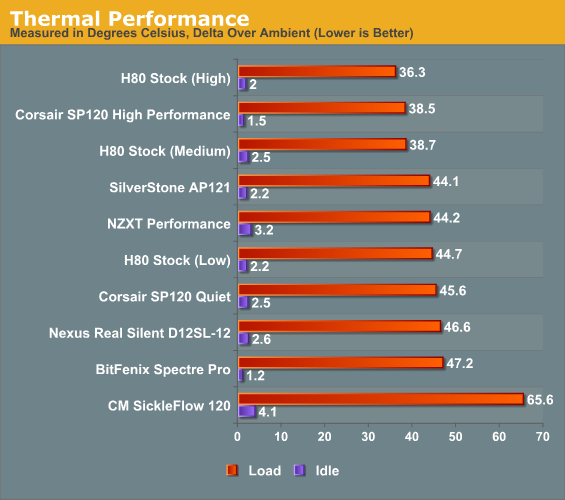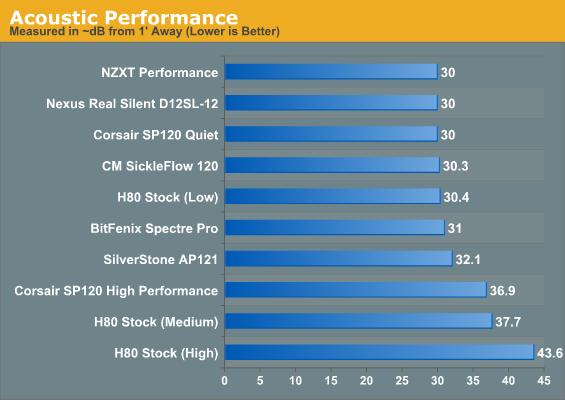Choosing the Best 120mm Radiator Fan: Testing Eight Fans with Corsair's H80
by Dustin Sklavos on August 23, 2012 12:01 AM ESTTest Results
Before we get into the performance results, a refresher: all eight fans on one chart for comparison. Note that if we're not taking noise into account, the highest static pressure fan should theoretically be the best performer. Our H80's fan settings are also only active with the stock fan; all others run at the full twelve volts.
| Fan | Airflow (in CFM) | Static Pressure (in mm/H2O) | RPM | Rated dBA |
| H80 Stock | 46-92 | 1.6-7.7 | 1300-2500 | 22-39 |
| SP120 Quiet |
37.85 |
1.29 | 1450 | 23 |
| SP120 High Performance | 62.74 | 3.1 | 2350 | 35 |
| SilverStone AP121 | 35.36 | 1.71 | 1500 | 22.4 |
| BitFenix Spectre Pro | 56.22 | 1.24 | 1200 | 18.9 |
| Nexus Real Silent D12SL-12 | 36.87 | 1.2 | 1000 | 18 |
| CoolerMaster SickleFlow 120 | 69.69 | 2.94 | 2000 | 19 |
| NZXT Performance | 47.27 | 0.95 | 1300 | 25.35 |
As far as static pressure goes, most of these fans are hanging out in about the same neighborhood. Acoustically, only Corsair's SP120 High Performance and stock H80 fan are even rated to go above the noise floor of our sound meter, though it's clear the stock fan is designed to move heat as fast as humanly possible. Let's see how all of these theoreticals worked out in practice, though.
Ambient temperatures ranged between 24C and 26C, and the margin for error in results is roughly 1C.

Thermally, if we ignore the H80's stock fan, the SickleFlow should've eaten the competition alive, but as it turns out CoolerMaster's specifications were more than just a little optimistic, as it was hands down the worst radiator fan we tested by a wide margin. If we organize the fans by rated static air pressure, they'd rank from best to worst: SP120 High Performance, SickleFlow 120, SilverStone AP121, SP120 Quiet, BitFenix Spectre Pro, Nexus Real Silent, and dead last, the NZXT Performance. As it turns out, though, only the SP120 High Performance really performs in line with its specifications; the rest just bunch up while the SickleFlow 120 is clearly the worst.
So how about acoustic performance?

Well, at least CoolerMaster's fan is quiet while it cooks your processor. To get that great thermal performance from the SP120 and H80 stock fan, though, you're going to have to put up with some noise. Note that these are load noise readings; the H80 stock fan idles at or below our sound meter's 30dB threshold at Low and Medium settings while sitting at 34.3 dB at High.
Interestingly enough, despite having among the worst rated specs, NZXT's Performance fan seems to find the best balance between thermal performance and acoustics; Corsair's SP120 Quiet does little to justify itself over the stock H80 fan. Corsair's engineers also turned out to be mostly right on the money: the H80 stock fan by and large seems to be the best choice, at least for the H80 itself. Its Low setting is competitive with the other fans both thermally and acoustically, while its Medium setting is competitive with the SP120 High Performance fan. The High setting is essentially unnecessary.










113 Comments
View All Comments
Ragesystem - Monday, August 27, 2012 - link
TerribleIgnoring the questionable quality of the single pass radiator, or that of an all in one rad, I'm not sure where you pulled those results for the sickleflow, because it's well known that those fans are excellent for radiators. Something isnt right here.
I would stay away from the noctua nf-p12 if youre going for a heavy oc, they are okay in dual or triple pass rads or in non-oc sitations, they just dont cut it.
Similicuir - Tuesday, August 28, 2012 - link
I found a (french unfortunatly) test here : http://www.hardware.fr/articles/867-15/noctua-nf-f...of NF-F12 PWM, it seems they are also testing it on radiator...doesn't look so great compared to others, especially when you consider their price.
maxcellerate - Friday, March 15, 2013 - link
I loved the French article or rather the translation: much more fun not quite knowing what's meant.But numbers are the same in any language and the clear winner was the Cooler Master Excalibur; which left favourites like the Cougar Vortex, Arctic Cooling, Scythe and Noctua for dust. And yet it doesn't appear on anybody's list of 'best fans'. It's number 1 position is also borne out in this very pertinent review http://www.techreaction.net/2011/12/20/water-cooli...
Which goes one step further than the French article, rather than just measuring air flow through a radiator (or not) measure the resultant temperature drop. Which after all is what it's all about (Yes, I go for performance over noise, within reason, I don't want to sit next to a hoover).
But what's most interesting to me about the techreaction article is that ALL the fans are within a 3 Celsius of each other.
Which tells me that there's really not much difference fans.
OK, there's only 15 fans reviewed, and there's no 1.99 'fan-u-like' fan reviewed; but there is a 3.99 Yate Loon which holds it's end up admirably.
So bottom line is: it's no disaster which fan you stick on your cpu cooler.
But as we all know, a 3 degree cooler cpu is a happy cpu.
Though yet again the 3.99 Yate Loon D12SM-12, has to be a no-brainer (if you can find someone who will sell you ONE).
Then again the Cooler Master Excalibur is 1.8 degree cooler...
Daggarhawk - Wednesday, August 29, 2012 - link
i agree with other commentators. this is a really interesting article, and helpful. dustin is on point again.would love to see the scythe, noctua and thermalright fans reviewed. particularly interested in thermalright since their silver arrow has led the pack in air cooling, and they are known for performance w quietness throughout their line.
jabelsk - Saturday, September 1, 2012 - link
Specs given by fan manufacturers (just like specs on flat screen TV's) are COMPLETELY MADE UP. I'm glad this story was written so more people can learn the truth. Here's another source of information on the subject:https://www.youtube.com/watch?v=9uUXt7mE6Qg&fe...
Also another way they mislead the consumer is by perpetuating the idea that fans are built for CFM *OR* static pressure. Physics says as CFM goes down pressure goes up and vice versa. So a good fan will be good at *BOTH* CFM and pressure, not one or the other, just more misleading marketing.
jabelsk - Saturday, September 1, 2012 - link
Fan specs given by manufacturers (just like specs on flat screen TV's) are COMPLETELY MADE UP. I'm glad this story was done so more people can learn the truth. Here is some more info on the subject:https://www.youtube.com/watch?v=9uUXt7mE6Qg&fe...
Also another way they mislead consumers is by perpetuating the idea that fans are only good at CFM *OR* static pressure. Physics tells us as CFM goes down pressure goes up and vice versa. A good fan will be good at *BOTH* CFM and pressure, not one or the other, just more misleading marketing.
jabelsk - Saturday, September 1, 2012 - link
sry double post. someone delete pls.LoneWolf15 - Sunday, September 9, 2012 - link
Both Noctua and Scythe apparently didn't make the cut. People here have already commented about Noctua, so I'll talk about Scythe. What, no Gentle Typhoons? They aren't cheap, but they're darned fine fans. I use Scythe S-Flex (FDB) fans as well, but the Typhoons are probably better for radiator use. Seeing as both Noctua and Scythe are highly regarded in the enthusiast crowd, I'm disappointed to see them missing in action.cronos1013 - Friday, September 28, 2012 - link
Dustin,OK so by doing this article and ignoring the 2 fans widely recognized as the best radiator fans on the 120mm market, you are showing how little credibility you have in this area, and how you didn't really do ANY research before going about testing these.
It's time to suck it up, buy 2 more fans and rerun these tests...because come on...nobody wants to know what the best of the under performing fans for radiators are.
-Chris
JonnyDough - Monday, October 22, 2012 - link
but what about fans that aren't mounted against one? Surely they will produce different noise than one pressed against a radiator.